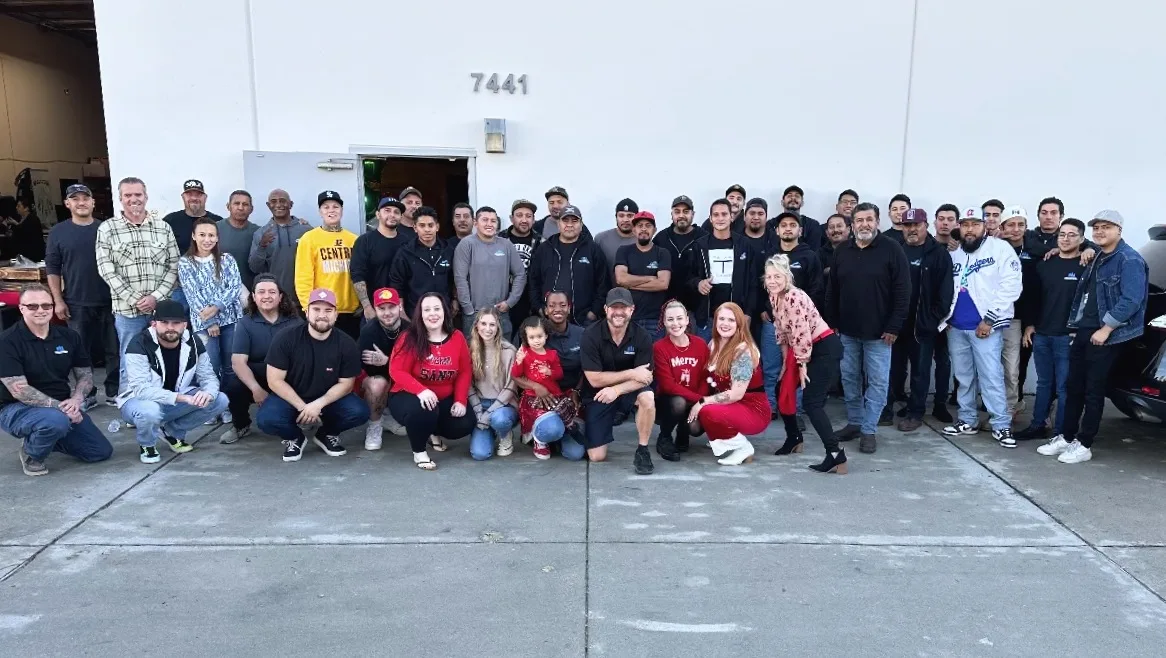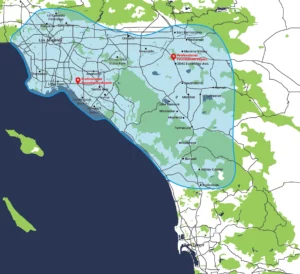Do Interior Wall Cracks Signal Foundation Problems?
Homeowners in Southern California often worry when they notice interior drywall cracks, wondering if they signal potential foundation issues. These cracks can range from hairline to larger, more concerning splits in the wall, raising questions about their home’s structural integrity. Understanding the different types of wall cracks and what they may indicate is crucial in determining if a foundation problem needs attention.
Table of Contents
What Causes Wall Cracks?
Wall cracks can be caused by various factors, including foundation settlement, structural damage, or poor construction techniques. Changes in the soil surrounding the foundation, poor drainage, or extreme weather conditions can also contribute to the development of cracks in the walls. Identifying the root cause of the cracks is essential in addressing the underlying issue and preventing further damage.
In addition to foundation movement, wall cracks can be linked to structural issues, such as settling or shifting over time. The seismic activity common in Southern California can also cause wall cracks. The professionals at Professional Foundation Repair can determine whether the issues are minor and can be easily fixed, or if they are more serious and indicate severe structural problems.
Call us today to schedule your foundation inspection. We'll help you evaluate the severity and type of cracks and determine the appropriate course of action to rectify the issue and ensure the stability of the home.
How To Know When A Wall Crack Is Serious
Identifying whether a wall crack is a minor cosmetic issue or a sign of serious foundation problems is crucial for homeowners. Factors such as the width, length, and direction of the crack can provide valuable insights into the severity of the issue. Hairline cracks are often considered less concerning, while wider, longer cracks may indicate potential foundation damage.
Additionally, the presence of stair-step cracks, horizontal cracks, or diagonal cracks can be indicators of underlying foundation issues that require immediate attention. Monitoring the progression of the cracks and seeking professional advice from a reputable foundation contractor like Professional Foundation Repair can help homeowners determine the best course of action to address the problem effectively.
Ignoring signs of foundation settlement or structural damage can lead to further complications and more costly repairs later on. Early detection and timely intervention can help mitigate the risk of extensive damage to the home and ensure its long-term stability.
Types Of Wall Cracks
Wide Cracks
Wide cracks in the walls can indicate significant foundation movement or structural damage. These cracks are typically more than 1/8 inch wide and may require a professional assessment to determine the appropriate repair solution. Wide cracks are usually a result of extensive foundation settlement or soil issues around the foundation that need to be addressed to stabilize the structure. Ignoring wide cracks can lead to more significant structural problems and compromised safety within the home.
Intervention by a foundation repair expert like Professional Foundation Repair is recommended for wide cracks to ensure that the underlying cause is identified and rectified to prevent further damage. Repairing wide cracks may involve foundation stabilization techniques or structural reinforcement to ensure the long-term integrity of the home.
Horizontal Cracks
Horizontal cracks in interior walls are often a sign of significant foundation movement or structural issues that require immediate attention. These cracks typically indicate pressure from the outside pushing against the foundation, leading to horizontal cracking in the walls. Horizontal cracks may be linked to issues such as poor drainage, foundation settlement, or soil movement, all of which can compromise the stability of the home.
Professional Foundation Repair can expertly evaluate horizontal cracks to determine the underlying cause and recommend appropriate repair solutions. Stabilizing the foundation and reinforcing the structure can help mitigate the risk of further horizontal cracking and ensure the home or building's safety.
Intervention by a foundation repair expert like Professional Foundation Repair is recommended for wide cracks to ensure that the underlying cause is identified and rectified to prevent further damage. Repairing wide cracks may involve foundation stabilization techniques or structural reinforcement to ensure the long-term integrity of the home.
Vertical Cracks
Vertical cracks in the walls are common and may not always indicate severe foundation problems. These cracks may be caused by minor settlement or normal wear and tear over time. While vertical cracks are generally less concerning, they should still be monitored for any changes or progression. Vertical cracks that widen over time or appear along with other signs of foundation issues may require further investigation by a professional. Understanding the underlying cause of vertical cracks can help homeowners determine the appropriate repair methods to address the problem effectively. ,
In some cases, vertical cracks may be purely cosmetic and only require minor repairs to restore the aesthetics of the wall. However, if vertical cracks are accompanied by other issues of structural concerns, call Professionial Foundation Repair in Garden Grove to assess the extent of the issue and prevent further damage.
Diagonal Cracks
Diagonal cracks in the walls often indicate significant structural movement or foundation issues. These cracks typically appear at an angle and may signal problems with the foundation settling or shifting. Diagonal cracks require professional evaluation to determine the appropriate repair approach.
Diagonal cracks can be symptomatic of underlying foundation problems that need immediate attention to prevent further damage to the home. Addressing diagonal cracks promptly is essential to ensure the stability and integrity of the structure. Professional Foundation Repair can provide an assessment and a foundation repair plan to stabilize the foundation and address the root cause of diagonal cracking.
Corner Cracks
Corner cracks in the walls are often a sign of structural movement or foundation settlement that requires prompt attention. These cracks may indicate issues with the home's foundation stability. Ignoring corner cracks can lead to more extensive structural damage and costly repairs down the line. Stabilizing the foundation and reinforcing the structure can help mitigate the risk of further corner cracking and ensure the long-term stability of the home.
Call Professional Foundation Repair today to schedule your foundation inspection and learn more about what's needed to shore up the foundation of your home.
Other Types of Wall Cracks
In addition to wide, horizontal, vertical, diagonal, and corner cracks, homeowners may encounter other types of wall cracks. These cracks may vary in size, orientation, and severity, requiring different repair approaches based on the underlying cause. Understanding the different types of wall cracks and their implications is crucial in addressing foundation issues effectively.
Cracks that appear suddenly or worsen over time should not be ignored, as they may indicate structural problems that need professional attention. Signs of foundation failure, such as cracks in multiple areas of the home or doors and windows that no longer close properly, should prompt homeowners to seek expert advice to prevent further damage.
Hairline cracks, although common in many homes, may also signify foundation movement or settlement that needs to be evaluated by certified foundation technicians like Professional Foundation Repair.
Differential Foundation Settling
Differential foundation settling occurs when one part of the home's foundation moves or sinks at a different rate than another part, leading to uneven stress on the structure. This differential settling can result in the development of wall cracks as the walls bear the brunt of the shifting foundation. Addressing the underlying cause of the foundation settling is crucial in preventing further damage to the home.
Monitoring signs of foundation movement, such as wall cracks, uneven floors, or doors that stick, can help homeowners detect early warning signs of structural issues. Seeking assistance from experts like Professional Foundation Repair is necessary to assess the extent of the foundation settling and implement appropriate repair solutions. We'll provide a complete plan detailing what's essential for stabilizing the home and ensuring its long-term stability.
Different factors like soil conditions, water drainage issues, or subpar construction methods can lead to uneven foundation settling. Identifying the root cause of the settling and taking proactive measures to address the issue can help homeowners protect their property and avoid costly repairs in the future.

Wall Crack Foundation Solutions by Professional Foundation Repair
When faced with wall cracks and potential foundation issues, homeowners can turn to our certified technicians at Professional Foundation Repair for effective solutions. Our professionals have the knowledge and expertise to assess the extent of the damage, identify the underlying cause, and recommend appropriate repair strategies to stabilize the foundation. Wall crack repair techniques may vary depending on the type and severity of the cracks, with solutions ranging from simple patching and sealing to more extensive foundation stabilization methods. Professional Foundation Repair offers long-lasting solutions to address foundation issues and prevent further structural damage to the home. By working with our experienced foundation repair specialists, you can rest assured that the repairs are done correctly and effectively to restore the stability of your home. Investing in professional foundation repair services can help safeguard your property's value and provide peace of mind knowing that the structural integrity of your home is protected. We offer services in Los Angeles, Long Beach, San Pedro, Fullerton, Santa Ana, Whittier, Torrance, Fullerton, Costa Mesa, Huntington Beach, Anaheim, La Habra, Riverside, Orange, and the surrounding areas.



